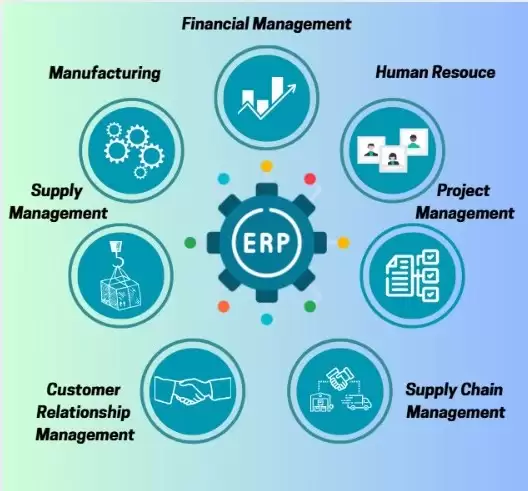ERP: Enterprise Resource Planning
ERP is a strategic tool that helps an organization in managing its core business processes.
From Finance and Human Resources to Supply Chain Management and Customer Relationships, ERP systems unite different processes into a single system. This integration not only helps in improving the data accuracy but also allows different departments to collaborate and make good decisions.
This system helps in various parts of business such as:
- Manages accounts, financial transactions and ensures compliance with regulatory standards.
- Handles employee payroll, recruitment, and performance management activities to maintain a productive workforce.
- Focuses on enhancing the inventory control and logistics, ensuring that products and services are delivered efficiently.
- Centralizes customer data for improved service and strategic marketing.
- Manages quality control and production schedules to optimize manufacturing processes.

The Key Benefits of Implementing an ERP System
Enhanced Efficiency and Productivity
By centralizing data and automating routine tasks, employees can focus more on strategic and value-adding activities rather than manual data entry, helps in faster decision-making. Without ERP, companies often use separate systems that don’t talk to each other, which leads to repeated work and extra paperwork. ERP systems automate everyday tasks like entering data, creating reports, and approving requests. This saves time and reduces mistakes.
Improved Data Accuracy and Consistency
ERP systems provide a real time data accessibility with standardized inputs and synchronized updates. Data become more reliable and consistent that helps the team in working with the most up-to-date information. ERP systems fix the problem of duplicity by bringing all the data together into one system. Everyone uses the same updated information, which makes the data more accurate and easier to trust. This helps managers make better decisions and reduces mistakes in planning and reporting.
Streamlined Business Processes
ERP systems help make business processes more organized and efficient. They bring different departments like finance, supply chain, sales, and HR together into one system, so everything works more smoothly.
For example: When a customer places an order, the ERP system can automatically update the stock, start production if need, and create an invoice—without needing people from different departments to handle it manually. This saves time, avoids confusion, and helps everyone stay on the same page.
Data-Driven Decision Making
ERP systems use real-time data and custom dashboards to help leaders easily track important numbers and trends. This helps them make smart plans and quickly respond to market changes, keeping the business competitive over time.
Scalability to Support Business Growth
As businesses grow, their operations become more complicated. ERP systems are built to grow with them, they can add new features, support more users, and connect with other tools as needed. This flexibility helps the ERP system stay useful and effective as the business expands.
Enhanced Customer Service
A centralized ERP system helps improve customer service by showing a full picture of each customer’s history, preferences, and interactions. Sales and support teams can use real-time information to solve problems faster and offer more personalized service, leading to happier and more loyal customers.
Regulatory Compliance and Risk Management
Many industries have strict rules they must follow. ERP systems often have tools to help businesses keep accurate records, track activities, and meet these rules. This reduces the risk of breaking regulations, helping companies avoid fines and protect their reputation.
Conclusion
ERP (Enterprise Resource Planning) system is now become important tool for businesses that want to work better, react quickly to changes, and make smart decisions using data. It helps in improving accuracy, save time, offer better service to customers, and reduce risks. So, ERP isn’t just a software—it’s a valuable part of the business strategy.
For companies looking to grow and go digital, using an ERP system can lead to long-term success, help them stay strong during challenges, and give them an edge over competitors.
About us
We are Timus Consulting Services, a fast-growing, premium Governance, Risk, and compliance (GRC) consulting firm, with a specialization in the GRC implementation, customization, and support.
Our team has consolidated experience of more than 15 years working with financial majors across the globe. Our team is comprised of experienced GRC and technology professionals that have an average of 10 years of experience. Our services include:
- GRC implementation, enhancement, customization, Development / Delivery
- GRC Training
- GRC maintenance, and Support
- GRC staff augmentation
Our team
Our team (consultants in their previous roles) have worked on some of the major OpenPages projects for fortune 500 clients across the globe. Over the past year, we have experienced rapid growth and as of now we have a team of 15+ experienced and fully certified OpenPages consultants, OpenPages QA and OpenPages lead/architects at all experience levels.
Our key strengths:
Our expertise lies in covering the length and breadth of the IBM OpenPages GRC platform. We specialize in:
- Expert business consulting in GRC domain including use cases like Operational Risk Management, Internal Audit Management, Third party risk management, IT Governance amongst others
- OpenPages GRC platform customization and third-party integration
- Building custom business solutions on OpenPages GRC platform
Connect with us:
Feel free to reach out to us for any of your GRC requirements.
Email: Business@timusconsulting.com
Phone: +91 9665833224
WhatsApp: +44 7424222412
Website: www.Timusconsulting.com





